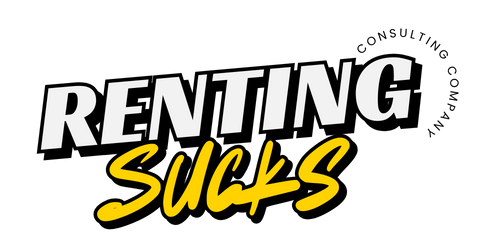Renting a home may seem like a convenient, low-commitment option, but for many, it ends up being a financial burden that limits long-term growth, stability, and freedom. While renting can be an appropriate short-term solution for some, it comes with several downsides that make it an unappealing choice for those who are ready for homeownership. Here are the key reasons why renting sucks, and why it might be time to reconsider renting as a long-term living situation.

You’re Paying Someone Else’s Mortgage
When you rent a property, you are paying rent to your landlord, who uses that money to cover the mortgage on the property or to profit from the investment. Essentially, you’re building your landlord’s wealth instead of your own. With every rent payment, you’re contributing to the equity in the property, but you have no ownership stake in it.
When you own a home, every mortgage payment you make builds your equity in the property, creating an asset that can increase in value over time. Renting offers no such opportunity for wealth-building. You’re simply paying for the privilege of living in someone else’s home with no return on investment.
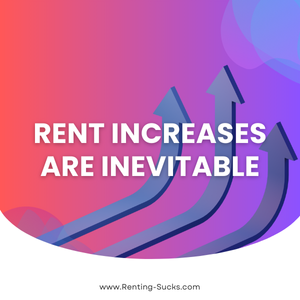
Rent Increases Are Inevitable
One of the most frustrating aspects of renting is the constant risk of rent hikes. While rent increases are often capped in some places, landlords have the legal right to raise your rent at the end of a lease term, especially in areas with high demand. This means that your monthly housing costs can increase unexpectedly, leaving you with less disposable income for other expenses, or worse, forcing you to move if the rent becomes unaffordable.
Owning a home gives you the stability of a fixed-rate mortgage. As long as you have a fixed-rate mortgage, your monthly payments will remain the same throughout the loan term, regardless of inflation or changes in the housing market. Renters, however, face the uncertainty of potential increases every time a lease is up for renewal.
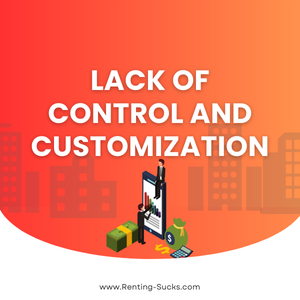
Lack of Control and Customization
When you rent, you are limited in how you can personalize or renovate your living space. Many landlords impose restrictions on painting walls, installing shelves, or even making simple changes like hanging pictures. This lack of control over your environment can make the space feel less like “home.”
On the other hand, when you own a home, you can customize your space to fit your tastes and needs. You can renovate the kitchen, paint the walls any color you want, or even make major changes to the layout of your home. Ownership allows you to invest in your property and create a space that reflects your personality and style.
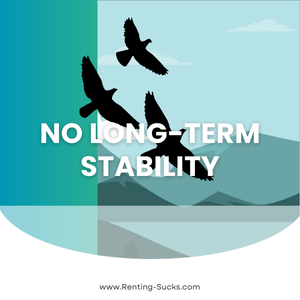
No Long-Term Stability
Renting offers no long-term stability. Many rental agreements last for only a year, and once that lease is up, you may face the possibility of having to move again, especially if the landlord decides to sell the property, raise the rent, or simply not renew your lease. This uncertainty can be stressful, especially if you’ve built a routine or established roots in the community.
Homeownership, however, provides a sense of permanence. Once you own a home, you don’t have to worry about a landlord deciding not to renew your lease or raising your rent. You can stay in your home for as long as you choose, giving you the stability and security to settle down, raise a family, or build a life in one place.
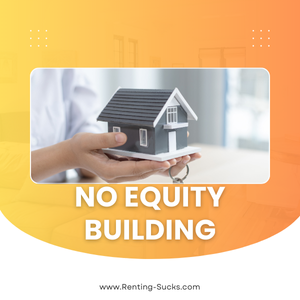
No Equity Building
One of the biggest drawbacks of renting is the fact that you are not building equity in your home. When you make rent payments, you’re essentially paying for the right to live in a space, but you’re not accumulating any ownership or wealth in return. Rent payments are money that you will never see again.
In contrast, when you own a home, your mortgage payments contribute to building equity—meaning you’re increasing your ownership stake in the property. Over time, this equity can grow, and as your home appreciates in value, you can build wealth. If you ever decide to sell, you may walk away with a significant return on your investment, which you can use for a down payment on your next home or for other financial goals.

You’re At the Mercy of Landlords
As a renter, you have limited control over decisions made by your landlord. If the property needs repairs, you may need to wait for the landlord to take action, and sometimes, landlords are slow or unwilling to address maintenance issues promptly. The quality of your living environment is often left to someone else’s discretion.
As a homeowner, you have the freedom to take immediate action on repairs and maintenance. If something breaks, you can fix it right away, or hire professionals to do so, without needing to wait for someone else to make a decision. You can also ensure that the work is done to your satisfaction, rather than relying on a landlord’s potentially lackluster efforts.
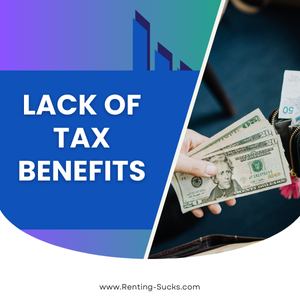
Lack of Tax Benefits
Homeowners receive a number of tax benefits that renters miss out on. For example, homeowners can deduct mortgage interest, property taxes, and other home-related expenses from their taxes, potentially saving thousands of dollars each year. Renters do not enjoy such deductions and instead simply pay their rent without any opportunity for tax relief.
These tax benefits can make homeownership even more affordable in the long run, especially as you build equity and pay down your mortgage. Renters, on the other hand, get no financial advantage beyond their basic housing needs.
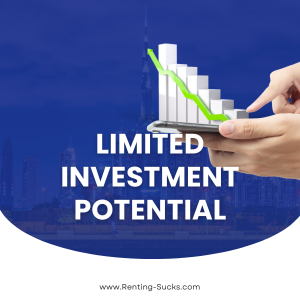
Limited Investment Potential
Renting also limits your ability to make long-term investments in real estate. As a homeowner, you can take advantage of rising property values in your area, which could allow you to sell your home for a profit in the future. If you choose to invest in real estate by purchasing a second home, rental property, or vacation home, you can generate passive income and diversify your financial portfolio.
Renters, however, have no such opportunity. You can’t profit from the appreciation of the property you live in, and you’re often stuck paying increasing rent over time. Renting doesn’t allow you to leverage the property for investment growth or wealth-building, which homeownership can offer.
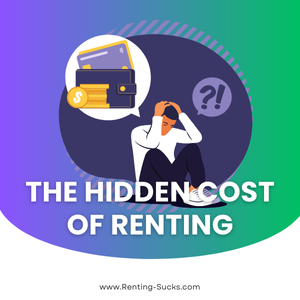
Renting may seem cheaper in the short term, but it often comes with hidden costs. Renters are typically responsible for utilities, insurance, and sometimes even maintenance costs, which can add up to a significant portion of their monthly expenses. While landlords are often responsible for major repairs, renters are left with no ability to build value from their payments.
On the other hand, homeownership has clear long-term financial benefits, including building equity and potential tax savings. Even if a mortgage payment is slightly higher than rent, the long-term financial advantages often outweigh the short-term savings.
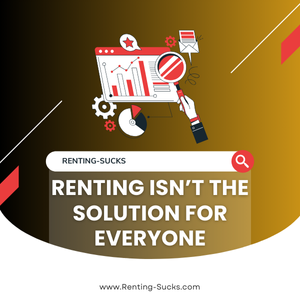
Renting Isn’t the Solution for Everyone
While renting might be a convenient option for certain life situations, it’s clear that long-term renting comes with significant drawbacks. It offers no equity-building, no stability, and limited control over your living space. Homeownership, on the other hand, offers long-term financial benefits, stability, and the freedom to truly make a home your own.
If you’re tired of paying rent to someone else without seeing any return on your investment, it may be time to consider buying a home. With the right financing options and expert guidance, you can start building your own wealth, enjoy long-term stability, and create a living space that reflects who you are.
